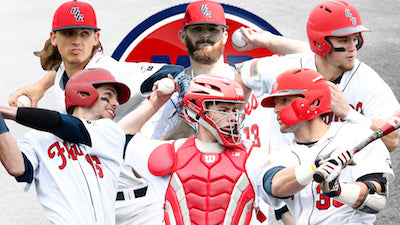Note: I've known the author, Nick, for over 10 years now. Not only does he like to shoot his meals and has passable taste in music, but he is a great strength coach. I've seen how his players respond and work for him. The difference between an average/good coach and a great one is usually communication. How does he get his athletes to believe in him and trust in his process? Is he able to get his message to an athlete without resorting to gimmicks or abandoning his principles? NIck has this in spades. Now read up. - Jim Wendler '17
I have been working as a strength and conditioning coach now since 2001 and have been at the Division I level for the past 15 years. In those 15 years I have had the privilege to work with hundreds of athletes from various sports but the one that has remained constant through all of my time in Division I has been baseball.
From my first interaction with my first college baseball coach, I have heard all of the B.S. and propaganda that comes along with training baseball players.
“Pitchers shouldn’t lift.”
“Pitchers shouldn’t train upper body.”
“Squatting makes these guys too bulky.”
“All I used to do when I played were some push-ups and some sit up.”
The list goes on. I also remember back in 2001 going to an NSCA conference and seeing Bob Alejo, long time baseball strength coach, speak on training baseball and his talk was entitled something like “Baseball Strength and Conditioning: Why Not?”.
In this talk, Alejo debunked a ton of the myths that were associated with training baseball players. He answered the question “Pitchers should never lift overhead” with ‘Why not?”. I remember him saying that these guys spent most of their time in athletics with their arms over their head and posed the question that if this is the position that the athlete will be in, wouldn’t you want that position to be as strong as you can get it? Needless to say, this talk had a huge influence on the way that I trained not only my baseball players but all of the athletes I work with.
At this point in my career, I have been EXTREMELY fortunate to have a lot of my athletes go on to the professional ranks at one level or another. I have worked at two schools that are not overly known as Baseball Powerhouses; Northwestern University and the University of Illinois at Chicago. Understand that lifting and training is only part of the puzzle, but I also do believe that the work we did in the weight room kept them healthy, disciplined and brought them together as a team throughout the year. It is also a great to see their physical progress manifest itself into confidence.
I believe that if it were not for the strength foundation that we laid in the weight room, some of the players would have not remained healthy during the season. This past season we started out with the 5/3/1 Big But Boring protocol for all my players, pitchers included! This season we had no major injuries and we won the regular season for our conference. We then won the conference tournament and made it to the first round of NCAA Regionals. In the post season, we had 6 players get drafted to the MLB (the most from any team in a single season from Horizon League) and two other guys sign deals after the draft. Now, with that being said, was it just the strength program that got these guys into the pros? Probably not. But the fact remains that we trained these guys as athletes; not as pitchers, catchers and position players.
The strength that we built allowed the athletes to play with power and display this power. Not only on the field but during testing. I do not care about how much my players squat, bench, deadlift or clean; I only want them to improve. However, we do test the vertical jump and the 10-yard sprint. These two tests, in my eyes, are better tests for athletes. And everyone who participated in our off-season weight program absolutely destroyed these tests. We build athletes with a balanced program; and part of that balance is getting stronger with a barbell.
Nick Zostautus
M.S., CSCS, SCCC, MSCC
Director of Strength and Conditioning
University of Illinois at Chicago




